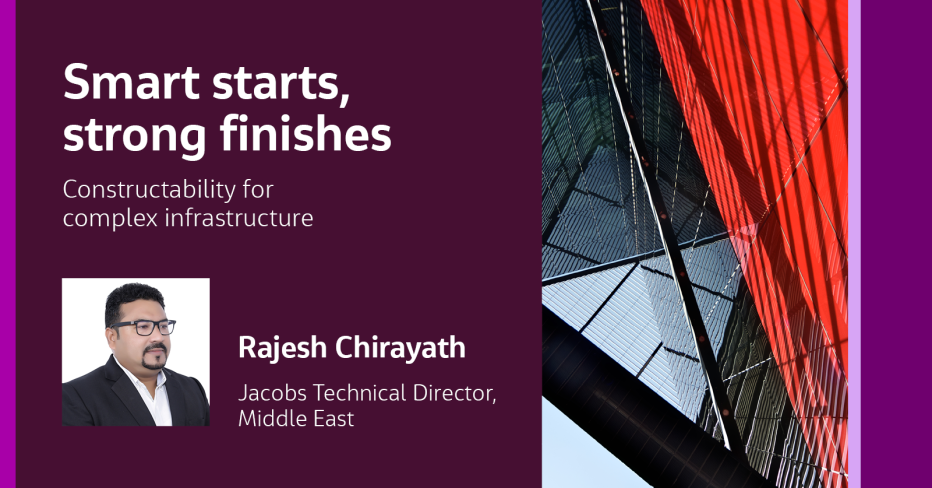
In the world of giga-scale delivery, decisions made in the first 60 days can make or break a project. Rajesh leads Jacobs’ constructability strategy across the Middle East, helping clients reduce rework, control cost and manage site realities before they impact progress.
From logistics planning and modular installation to early contractor thinking and digital rehearsals, constructability connects design vision to delivery on the ground.
This article builds on Rajesh’s recent conversation on The AForm Show podcast, where he shared insights on bridging design and execution through constructability, digital planning, and early-stage decision making in complex projects. Listen to the full episode here E095 - Rajesh Chirayath - The aForm Show - Apple Podcasts
The first 60 days matter
Jacobs is often brought in at the very start of a giga project—to assess feasibility, define program logic and evaluate scope before work begins. Our constructability-first approach considers a range of elements including sequencing, logistics and package integration to ensure that projects are not only technically viable but efficiently buildable.
This includes identifying:
- Temporary work zones
- Schedule constraints
- Labor resourcing needs
- Modularization potential
A coordinated site is safer and more productive and constructability is how we help clients get there.
Collaborative planning and delivery readiness
“We plan for delivery from day one—because complexity doesn’t wait.”
One of the most overlooked aspects of constructability is how early collaboration shapes everything that follows. At Jacobs, we align design, program management and construction management (PMCM) teams from the start—so delivery decisions like access, crane locations, lifting logistics and temporary works are integrated early, not retrofitted later.
We also explore offsite assembly strategies and modular construction opportunities, especially on dense urban sites where laydown space is limited. In some cases, we’ve helped clients adjust podium loading capacity to safely store and transport materials within the structure, rather than relying on nonexistent laydown areas.
Worker welfare is another key factor. Access planning, circulation and lifting strategies aren’t just operational—they’re design inputs. Engaging early allows us to set contractors up for safe, efficient and predictable delivery.
This isn’t just constructability—it’s construction intelligence, built in from the beginning.
Going beyond the buzzwords: The digital advantage
Everyone talks about digital delivery—but our approach integrates constructability directly into digital project controls. Using tools like Acuity, we visualize data, flag risk, trigger early warnings and feed decisions back into project models and schedules.
This closed-loop digital system supports:
- Construction phasing
- Real-time coordination
- Scalable team integration
Supported by AI-driven design automation, it helps simplify complexity, protect timelines and build delivery confidence. It’s more than reporting—it’s about taking action, fast.
Better delivery starts long before construction
Constructability isn’t an add-on—it’s a mindset. At Jacobs, we embed it into everything from project strategy, team collaboration and digital tools from day one. As giga-scale developments continue to shape the Middle East, the way we plan, coordinate and stress-test delivery will define success. By starting smart, we finish stronger.












































